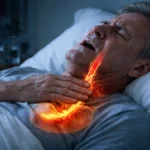Introduction
A high heart rate during an asthma attack can be alarming and may indicate severe respiratory distress. Understanding why this happens, recognizing the symptoms, and knowing how to manage it can be life-saving. This guide explores the link between asthma and tachycardia (rapid heart rate), common triggers, and effective management strategies to help patients breathe easier.
High Heart Rate During Asthma Attack: Summary Guide
| Factor | Description |
|---|---|
| Low Oxygen Levels (Hypoxia) | Airways constrict, reducing oxygen intake, causing the heart to pump faster. |
| Stress and Anxiety | The body’s fight-or-flight response releases adrenaline, increasing heart rate. |
| Bronchodilator Medications | Rescue inhalers like albuterol can cause rapid heartbeats as a side effect. |
| Dehydration and Electrolyte Imbalance | Rapid breathing leads to fluid loss, making the heart work harder. |
| Inflammation and Airway Obstruction | Inflamed airways force the cardiovascular system to exert more effort. |
Symptoms of High Heart Rate During an Asthma Attack
| Symptom | Details |
|---|---|
| Rapid or pounding heartbeat (Tachycardia) | Heart rate above normal levels, often exceeding 100 bpm. |
| Shortness of breath | Difficulty breathing, often worsening the panic response. |
| Dizziness or lightheadedness | Low oxygen levels can cause faintness and unsteadiness. |
| Chest tightness | A feeling of pressure or discomfort in the chest. |
| Excessive sweating | Result of stress and increased heart workload. |
How to Manage a High Heart Rate During an Asthma Attack
| Management Step | Action |
|---|---|
| Stay Calm and Control Breathing | Practice slow, deep breathing techniques like pursed-lip breathing. |
| Use Rescue Inhaler as Directed | Follow prescribed dosages to avoid excessive heart stimulation. |
| Sit Upright | Improves airflow; avoid lying down. |
| Hydrate | Drink water to restore balance and reduce heart strain. |
| Monitor Symptoms | Seek medical attention if heart rate remains high despite treatment. |
| Seek Emergency Care | Call 911 if experiencing severe symptoms like chest pain or confusion. |
Preventing High Heart Rate During Asthma Episodes
| Prevention Strategy | Details |
|---|---|
| Avoid Known Triggers | Stay away from common irritants like pollen, dust, smoke, and pet dander. |
| Follow an Asthma Action Plan | Develop a personalized plan with your doctor. |
| Manage Stress and Anxiety | Practice meditation, yoga, or controlled breathing exercises. |
| Use Medication Responsibly | Avoid overusing rescue inhalers and consult your doctor for alternatives. |
| Maintain a Healthy Lifestyle | Exercise moderately, eat a balanced diet, and stay hydrated. |
What Causes a High Heart Rate During an Asthma Attack?
Several factors contribute to an increased heart rate during an asthma attack, including:
1. Low Oxygen Levels (Hypoxia)
- When airways constrict, less oxygen reaches the bloodstream, causing the heart to pump faster to compensate.
2. Stress and Anxiety
- Asthma attacks can trigger the body’s fight-or-flight response, releasing adrenaline that speeds up the heart rate.
3. Bronchodilator Medications
- Rescue inhalers (e.g., albuterol) stimulate the beta receptors in the lungs, relaxing muscles but also increasing heart rate as a side effect.
4. Dehydration and Electrolyte Imbalance
- Loss of fluids from rapid breathing can lead to an imbalance, making the heart work harder.
5. Inflammation and Airway Obstruction
- Persistent inflammation forces the cardiovascular system to exert more effort, increasing pulse rate.
Symptoms of High Heart Rate During an Asthma Attack
Recognizing the signs of an elevated heart rate during an asthma attack can prevent complications. Symptoms may include:
- Rapid or pounding heartbeat (tachycardia)
- Shortness of breath (dyspnea)
- Dizziness or lightheadedness
- Chest tightness or discomfort
- Excessive sweating
- Panic or anxiety
How to Manage a High Heart Rate During an Asthma Attack
If you experience a rapid heart rate during an asthma episode, take the following steps:
1. Stay Calm and Control Breathing
- Panic worsens symptoms; practice slow, deep breathing techniques like pursed-lip breathing.
2. Use Your Rescue Inhaler as Directed
- Follow prescribed dosages to avoid excessive stimulation of the heart.
3. Sit Upright to Improve Airflow
- Avoid lying down, as it can further restrict breathing.
4. Hydrate and Replenish Electrolytes
- Drinking water helps maintain balance and reduces heart strain.
5. Monitor Heart Rate and Symptoms
- If the heart rate remains high after medication, seek medical attention.
6. Seek Emergency Care If Necessary
- Call 911 if symptoms include severe chest pain, confusion, or persistent shortness of breath.
Preventing High Heart Rate During Asthma Episodes
1. Avoid Known Triggers
- Common asthma triggers include pollen, dust mites, smoke, cold air, and pet dander.
2. Follow an Asthma Action Plan
- Work with your doctor to develop a personalized plan that includes medication and emergency steps.
3. Manage Stress and Anxiety
- Practice relaxation techniques like meditation, yoga, or controlled breathing exercises.
4. Use Medication Responsibly
- Avoid overuse of rescue inhalers and discuss long-term control medications with your healthcare provider.
5. Maintain a Healthy Lifestyle
- Regular exercise (within comfort levels), a balanced diet, and proper hydration contribute to overall respiratory health.
Conclusion
A high heart rate during an asthma attack can be concerning, but understanding its causes and management can help you stay in control. By following a structured asthma action plan, avoiding triggers, and seeking medical attention when necessary, you can minimize risks and improve overall respiratory health. If you frequently experience tachycardia during asthma attacks, consult a healthcare professional for personalized treatment options.
Take Action: If you or a loved one suffers from asthma, make sure you have an up-to-date asthma action plan and the right medications on hand. Share this article to spread awareness and help others manage their condition effectively!
FAQs
1. Can an asthma attack cause dangerously high heart rates?
Yes, severe asthma attacks can lead to tachycardia, which, if untreated, may cause complications like arrhythmia or even cardiac arrest.
2. What heart rate is considered too high during an asthma attack?
A resting heart rate above 100 bpm is considered tachycardia. If it exceeds 120-130 bpm and does not decrease with treatment, seek medical help.
3. Does albuterol always cause a fast heart rate?
Not always, but it is a common side effect. Some people are more sensitive to bronchodilators than others.
4. How can I naturally lower my heart rate during an asthma episode?
Practicing slow breathing, staying hydrated, and reducing stress can help control heart rate.
5. When should I go to the hospital for an asthma attack?
Seek emergency care if symptoms persist despite medication, your lips or fingernails turn blue, or if you’re struggling to speak or walk.











